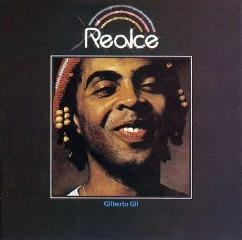Gilberto Gil - Realce (1979)
Gilberto Gil - Realce (1979)

1. Realce 4:48 2. Sarará Miolo 4:51 3. Superhomem - A Canção 4:06 4. Tradiçao 4:53 5. Marina 4:16 6. Rebento 2:55 7. Toda Menina Baiana 3:52 8. Logunedé 4:01 9. Não Chore Mais (No Woman, No Cry) 4:43 Personnel: Bass – Bob Cloud (tracks: A1), Liminha (tracks: B5), Rubão Drums – Luiz Carlos, Pedrinho (tracks: B5), Rick Schlosser (tracks: A1) Electric Piano [Fender Rhodes] – Mark Jordan (tracks: A1), Tuca (2) Electric Piano [Fender Rhodes], Piano, Arranged By [Strings] – Lincoln Olivetti (tracks: B5) Guitar – Perinho Santana, Steve Lukather (tracks: A1) Guitar, Soloist – Sergio Dias (tracks: B5), Steve Lukather Handclaps – Bill Champlin, Mazola Percussion – Ariovaldo (tracks: B5), Djalma Correa, Liminha Producer – Mazola Saxophone – John D'Andrea (tracks: A3) Saxophone, Flute – Kim Hutchoroft*, Larry Williams Strings – Orquestra De Cordas WEA (tracks: B5) Synthesizer [Bass] – Michael Boddicker (tracks: A3) Synthesizer [Moog, Strings] – Michael Boddicker Synthesizer [Oberheim] – Jorginho (tracks: B5) Tambourine – Gilberto Gil (tracks: A2, A3) Trombone – Bill Reichenback, Charlie Coper Trumpet – Gary Grant, Larry Hall Trumpet, Arranged By [Horns] – Jerry Hey Vocals – Bill Champlin, Carmen Twillie, José Eduardo (tracks: B5), Maria Aparecida, Maria de Fátima,
Maria Helena (tracks: B5), Maria Rita, Martha Santos, Vennette Cloud Vocals, Acoustic Guitar [Nylon, Ovation], Handclaps, Arranged By [Basic] – Gilberto Gil
The end of the military dictatorship in Brazil left the country lost in its references and opened way for a period of wild hedonism. Realce, one of Gilberto Gil's most disco-influenced albums, is a document of that period. Released in LP format in 1979, it had the disco ideology expressed in several songs like "Realce" (which became slang for a dangerous drug frequently consumed in those places), "Sarará Miolo" (also a danceable tune, finds room for social criticism through black pride, where Gil reproaches the use of straightening and discoloring of hair by his brothers and sisters), "Marina" (featuring Dorival Caymmi), and "Toda Menina Baiana" (a hybrid of disco and Bahian samba). But there are other songs more faithful to Gil's style. "Superhomem - A Canção" is a sensitive ballad about the bisexual composition of human psyche, and the importance of the feminine in society. "Tradição" is a beautiful samba, richly harmonized, and the lyrics talk about Gil's fascination with a guy of the streets. "Rebento," another juicy samba with intelligent lyrics, was re-recorded by Elis Regina. And "Não Chore Mais," which was another big hit of the album, is a version of B. Vincent's "No Woman, No Cry" made famous by Bob Marley. --- Alvaro Neder, Rovi
Last Updated (Friday, 25 September 2015 11:47)








